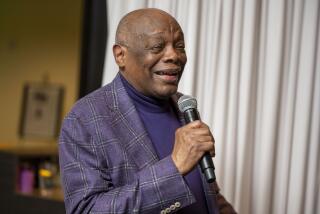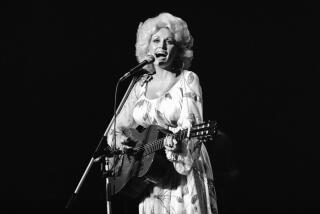Boland Gets Some Revolutionary Advice
- Share via
It was well past the witching hour in Sacramento and visions of secession were dancing in Paula Boland’s dreams. The day before, the legislation that defined the assemblywoman’s identity had cleared another hurdle. She was sleeping well--perhaps too well.
A chill swept over her. Suddenly, she was awake and frightened.
Three men were standing at the foot of her bed, but something kept her from screaming. She’d seen those faces before, usually with the greenish tint of currency.
“Don’t be alarmed, dear woman,” the eldest visitor said. “Allow me to introduce my friends from Virginia, Gen. Washington and Mr. Jefferson. I’m from Philadelphia. The name is Franklin.”
Paula Boland gasped. “The Founding Fathers!”
“The same,” Franklin replied with a modest bow. “Some of us, anyway.”
“I’m so glad you’ve come! There’s so much I want to ask you. The way I see it, the San Fernando Valley Revolution is at that tea party stage. You men are such an inspiration. Don’t you just love the way we say, ‘No taxation without representation!’ Doesn’t John Ferraro remind you of King George?”
Franklin, Jefferson and Washington exchanged glances. Their mission, they realized, wouldn’t be easy.
*
Franklin and Jefferson, experienced diplomats, took the lead.
“Kind woman,” Jefferson began, “please know that we appreciate your feelings. You might say we feel your pain. We understand that people want life, liberty, the pursuit of happiness--all that stuff.”
“Exactly!” Boland said. “That’s exactly what the Valley wants!”
“Well, yes,” Jefferson continued. “Of course, that’s what everyone, everywhere wants. But frankly, we’re not sure you’re going about it the right way. In today’s hearing, you declared, ‘We would not today be the United States of America if we had to ask Mother England if we could be a country or not.’ ”
“Gee,” Boland replied, “I thought that was a pretty good line. What, do you think I didn’t go far enough? You think I should have used that King George line on Ferraro? Can you believe the nerve of that guy, saying my bill isn’t about democracy! Of course it’s about democracy. It’s about giving people the right to vote.”
Responded Jefferson: “I’m afraid we disagree. Your bill would give some people the right to vote. You envision an election that would allow some Angelenos the right to say whether all of Los Angeles should be broken in two. We did not fight the American Revolution so that some Americans would seek to deny other Americans their rights. Your fair city is not Mother England and Mr. Ferraro is not King George.
“Indeed, with all due respect, we believe Mr. Ferraro, the president of your City Council, is absolutely correct. If you want to hold an election to consider the division of Los Angeles, then it’s only fair and just that your bill be amended to ensure that no citizen be denied a say in the matter.”
Boland was aghast. “But that would kill my bill!”
Now Franklin stepped forward, smiling sweetly. “But, dear woman, why would that kill it? What are you afraid of? Revolution is not for the faint of heart. You have allies down in San Pedro, don’t you? They want to secede too. Why not play both ends against the middle? Why not split the city in three? Why, dare I say it, Councilman Rudy Svornich could play Lafayette to your Washington!”
At this, Washington, sternly silent, gave Franklin a look that could have killed him if not for the fact that both were already dead.
The assemblywoman didn’t notice. She glowed as she considered Franklin’s flattery and bold advice. Then she looked up to the formidable, dignified presence that was Washington.
“Gen. Washington, sir, what do you think I should do?”
The Father of Our Country cleared his throat.
“Madame, I am not a diplomat,” he said. “I will not try to influence you with sweet words. You have asked, and I will answer. What I think you should do, Madame, is retreat from this detestable, undemocratic idea that would deny your fellow Angelenos their due rights as citizens--rights that my soldiers fought for, along with brave men and women who followed in their footsteps. With the Fourth of July approaching, this shallow rhetoric about your Valley’s right to ‘self-determination’ dishonors the memory of Valley Forge. If you must insist on this path, the least you could do is follow Mr. Franklin’s advice. To do any less, Madame, would be un-American. And as you may have heard, I cannot tell a lie.”
Paula Boland seemed chastened. Then, suddenly, she was angry.
“This is worse than Hillary talking to Eleanor Roosevelt! Who are you to lecture me about democracy? In your day, women didn’t even have the right to vote! In your day, I’d have been lucky to have sewn a flag. Well, whoop-de-do. You and Jefferson owned slaves! And I’m supposed to think you guys are authorities on human liberty!?”
The dead white males sighed. They’d heard all this before.
“We are all prisoners of our age, Madame,” Washington said. “But let me just add this: I knew Betsy Ross. Betsy Ross was a friend of mine. And Madame, you’re no Betsy Ross.”
*
A millisecond later, Washington, Jefferson and Franklin were briefing God.
Elsewhere in the spiritual cosmos, another briefing was taking place.
“It was a close call, chief,” Benedict Arnold said. “Then I reminded her about the skeletons in their closets.”
“Good work, Benny,” came the reply. “Now get me Jefferson Davis on the double. Their next move is pretty obvious.”
More to Read
Get the L.A. Times Politics newsletter
Deeply reported insights into legislation, politics and policy from Sacramento, Washington and beyond. In your inbox three times per week.
You may occasionally receive promotional content from the Los Angeles Times.










